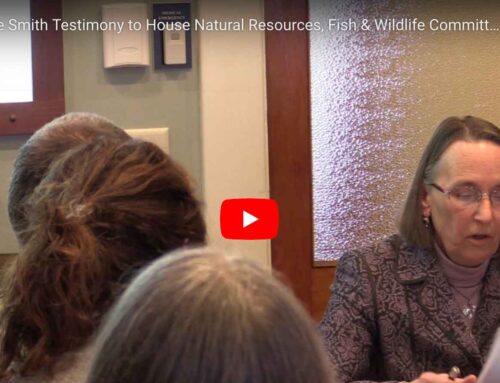http://vtdigger.org/2016/02/05/marge-garfield-a-lopsided-and-losing-battle/
Editor’s note: This commentary is by Marge Garfield, who is an activist, occasional writer and wannabe fiddler who lives in North Calais. She is a volunteer archivist at The Vermont Historical Society, and a member of the North Calais Neighborhood Coalition, which opposed a wireless tower on a rural road in that town.
Iwas outraged to learn of the trumped-up allegation that Annette Smith, longtime advocate for protecting Vermont’s environment from stupid human mistakes, is supposedly “practicing law without a license.”
In Vermont, large-scale telecom and energy projects are fast-tracked through a separate, self-fulfilling “quasi”-judicial system that is purposely opaque, to discourage opposition. Any person or town opposing a project must either hire an attorney to participate, or they must navigate the shark-infested waters of pro se pleading on their own.
The Vermont Department of Public Service (DPS) guide to the Section 248a process states: “Parties are allowed to appear before the Board pro se (i.e. without a lawyer) but it is recommended that interested persons at least consider securing legal representation before intervening in a case.” Hmm. Sounds ominous. “A motion to intervene … should be made in legal memoranda submitted to the Clerk of the Board.” Not very encouraging for people who have no idea what a “legal memorandum” is or how to write one. The guide provides puny five line definitions for pre-hearing conference, discovery, and evidentiary hearings. Presumably, those snippets are all you need to go up against top-drawer attorneys with their law degrees and decades of experience. At this point, a person lacking the means to hire counsel is predictably discouraged by the steep learning curve. It’s one of several ways the Vermont Public Service Board (PSB) process stacks the deck against opposition while fast-tracking infrastructure projects through the system.
Into the void steps Annette Smith to offer help to the rare citizen or group with enough gumption to oppose a project. Annette doesn’t represent herself as anything other an activist representing Vermonters for a Clean Environment, her nonprofit citizens’ advocacy group. She does not pose as an attorney nor pretend she has any particular legal expertise — just the contrary. She refuses to give legal advice, nor is she qualified give it. She does not charge money for her input. From her own broad experience as a layman advocate, Annette educates others about the PSB’s Section 248 and the Act 250 processes by translating the exacting procedural steps into plain English. She provides basic information that people then take and run with themselves. To my knowledge, there is no law against providing this peer-based service – at least I certainly hope not, for it would shut down all support groups in the state. It would amount to barring free speech. At the other end of the spectrum are duly licensed attorneys who gladly sign up opposition clients and take their money, and fully admit they’re fighting an uphill battle in cases they can then blamelessly lose. But no one is filing any complaints about those lawyers.
This ill-conceived accusation against Smith is akin to the Coca-Cola Co. suing a child with a lemonade stand for unfair competition.
Here’s the sad reality of legal representation in Section 248 cases: Even when you want a lawyer and can afford one, there is no one to hire! To begin with, there are very few environmental attorneys in Vermont, those who specialize in Act 250 and/or Section 248 cases. With hundreds of new utilities projects coming into the state at any given time, competition for these few top-tier firms eliminates the little guy. Big companies glom up the high-profile law firms early on and retain them, or they extort a firm’s loyalty with the prospect of future hiring. Ambitious attorneys don’t like poor little opposition clients. There’s no glory in representing them. And less money. To make matters worse, if a lawyer in a firm already represents a developer, you cannot retain any other lawyer in that firm due to conflict of interest. So Joe Schmoe or a neighborhood group, if they do overcome the odds and find legal representation, are left with the dregs.
Whoever is harassing the well-meaning Annette Smith is only trying to create more roadblocks for opposing parties. But opposition plays a very important role. It can uncover just how bad or stupid or unnecessary a project is. Where are “checks and balances” without opposition? Who will protect this beautiful state of ours from undue development when no one in state government is specifically tasked to do so? This ill-conceived accusation against Smith is akin to the Coca-Cola Co. suing a child with a lemonade stand for unfair competition.
If the Vermont Attorney General’s Office wants do something really worthwhile, instead of obstructing someone who tries her utmost to prevent the state from making costly mistakes, they would investigate the DPS’ practice of using the 248 “fast-track” system to unfailingly favor developers, and cure the glaring injustices that lurk there.
Instead of condemning and accusing Annette Smith, the AG should recommend she be appointed to the proposed Division of Telecommunications and Connectivity’s Advisory Board. Annette is a lay person with no industry connections who has had 16 years of experience in infrastructure issues. She knows what fairness is and she devotes her life to preventing our beautiful state from shooting itself in the esthetic foot. She is exactly what that advisory board needs. No other person or agency in our state government is tasked with performing that role, so, please, let’s not “lynch” Annette Smith when we need her so badly.


